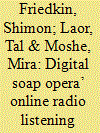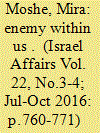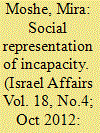| Srl | Item |
| 1 |
ID:
151819


|
|
|
|
|
| Summary/Abstract |
This article examines the gendered digital divide in Israel in the age of the radiophonic cyber-revolution. The research focuses on increased listening patterns to on-demand, radiophonic content via online radio. Recent years have witnessed a shift in the second level of the gendered digital divide. This shift is effectively captured by the notion of ‘can’t’ transforming into a ‘don’t want to be bothered’ mindset. To explore this phenomenon an online survey was conducted on online listeners of a regional radio station. Israel’s top-rated regional station, 103FM-Non-Stop Radio, was selected. The survey was conducted in April 2014. A total of 2013 listeners were surveyed: 1491 men and 522 women. Our results found that for the under 35 years of age listeners increased listening patterns were gender-blind. The same conclusion was reached for other demographic groups: The findings from this group do, in fact, attest to a gendered digital divide. The key demographic groups here are married couples and parents. These trends highlight the continued need for further research into online radio listening patterns and their relationship to gender-related differences in the digital age.
|
|
|
|
|
|
|
|
|
|
|
|
|
|
|
|
| 2 |
ID:
149196


|
|
|
|
|
| Summary/Abstract |
Voting behaviour is often constructed by candidates’ ability to manipulate and set in motion voters’ social ‘nervous system’ by means of juxtaposing two social groups – ‘ours’ and ‘theirs’ – against one another. In the Israeli political arena, this means a sociopolitical ‘zero sum’ game between the right wing and the left wing. The present article seeks to decode the characteristics of right-wing vs. left-wing cognitive metaphors activated in the 2015 Israeli elections. Findings indicate that both sides sought to activate cultural schemes based on a sense of local belonging and social identity, with the emotional discourse focused on identifying and excluding internal enemies (i.e. those who are not ‘us’ or belong to ‘our group’).
|
|
|
|
|
|
|
|
|
|
|
|
|
|
|
|
| 3 |
ID:
116188


|
|
|
|
|
| Publication |
2012.
|
| Summary/Abstract |
This article deals with the social representation of incapacity in Israeli political culture by applying CDA (critical discourse analysis) to two outstanding cases of incapacity: permanent incapacity in the case of Prime Minister Ariel Sharon as a result of illness and temporary incapacity in the case of President Moshe Katzav, following a police investigation. A social representation of incapacity in leading figures as seen in the headlines of Ha'aretz (an elite Israeli newspaper) was analysed, with the following results: a) in the case of Prime Minister Sharon, he is a warrior battling for his life, while his successors battle for governmental control and stability; b) in the case of President Katzav, he veers between attacker and attacked. The psycho-social analysis of the political-cultural scene indicates that these social representations provide a mechanism for maintaining stability and cushioning shocks while also disseminating a pronounced sense of confusion.
|
|
|
|
|
|
|
|
|
|
|
|
|
|
|
|